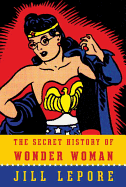
Every superhero has an origin story, a secret past that influences his or her present. As Harvard historian and New Yorker staff writer Jill Lepore (Book of Ages; New York Burning) discovers, Wonder Woman's history is rooted in the feminist ideals of the early 1900s. This Golden Age icon was created in 1941 to combat Superman's masculinity; she fought for equality, but her stories' underlying themes of shackling, bondage and unrepentant sexuality as metaphors for women's repression unleashed cries for censorship.
Wonder Woman embodied the philosophical beliefs of her creator, William Moulton Marston. A lawyer, a psychologist, the inventor of an early lie-detector test and a comic-book writer, he led a double life in more than one respect. He was a champion of matriarchal progress, but behind the scenes he lived with two brilliant, accomplished women at the same time--Elizabeth Holloway and Olive Byrne, who each bore him two children--and relegated them to roles of patriarchal service, spinning and promoting his philosophical beliefs. His story intersects with those of birth-control activists Ethel Byrne and Margaret Sanger (the mother and aunt of Olive Byrne, respectively), whose own political careers relied on maintaining the secrecy of Olive's domestic situation.
"Feminism made Wonder Woman... and then Wonder Woman remade feminism, which hasn't always been good for feminism," writes Lepore. Though critical of Marston's excesses and the costs they incurred for the women in his life, she handles all the salacious details and character quirks of the man and his entourage with the deft hand of a novelist, creating a balanced narrative of this heroine's controversial history. --Nancy Powell, freelance writer and technical consultant

